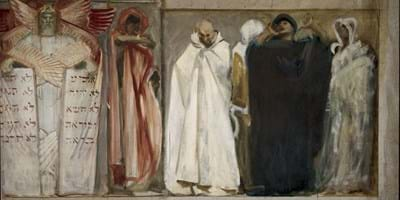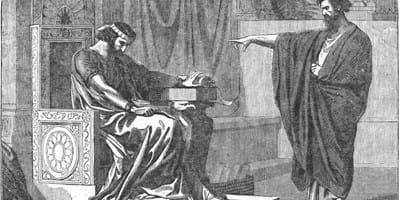God-designed evidence
I'm going to let you into a secret at the start: God has so designed the world that it is only the seekers after Him who find Him, not the people who are indifferent to Him. In fact we read these words of God in the Bible: “you will seek Me and find Me, when you search for Me with all your heart” (Jeremiah 29:13). God will not overwhelm you with evidence to make you believe despite yourself, but rather gives sufficient evidence for those who are willing to follow were it leads.
Getting to know and experience God isn't the same as learning facts about Him because it involves a personal willingness to accept the evidence and receive the Person. If you are not prepared to put aside your own preferences, do not expect to be convinced. Of course, believing God exists isn't the same as coming to know Him personally, but the one is a prerequisite for the other. The Bible puts it like this: “he who comes to God must believe that He exists, and that He rewards those who seek Him” (Hebrews 11:6, ESV).
If you are sceptical at this point, can I respectfully ask you why is it that you don't believe Christianity is credible? Is it because you are convinced after thorough research that there isn't enough evidence? Or could it be that you are comfortable with your life and don't want the claims of Christianity to disturb you?
The Credibility of Christ
The great founder of Christianity is Jesus Christ. It is important in dealing with our subject that we firstly consider His credibility.
Historical Credibility
Reputable historians are pretty much agreed on the existence of Jesus. Not only is there overwhelming documentary evidence in the Gospel records1 but also from many non-Christian sources.
Some will claim that, as those who penned the Gospels were Christians, they had an ulterior motive which undermines their witness statements. However, one way in which we can see that discrediting witnesses in this manner is not helpful in verifying facts is by looking at an event in more recent history.
The main historical facts of the Nazi Holocaust are not usually under dispute even though many of the eye-witnesses were Jews. By using the “discrediting” argument we could say that Jews who survived shouldn't be treated as credible witnesses. It could be argued that, as they were predisposed to hate Nazis, we must view their evidence with suspicion. However, this would be unreasonable as the evidence of the Jews is corroborated by non-Jews allowing us to conclude that they were actually reliable eye-witnesses.
In the case of the life and death of Jesus, there is also corroborating evidence from many non-Christian sources. In fact, one author has said that “Not even Christianity's deadliest enemies in those early centuries thought that Jesus was a myth”2. For example, we can take Josephus, the Jewish historian (AD 37-100), who describes Jesus like this:
At this time there was a wise man who was called Jesus. His conduct was good, and [he] was known to be virtuous. And many people from among the Jews and the other nations became his disciples. Pilate condemned him to be crucified and to die. And those who had become his disciples did not abandon his discipleship. They reported that he had appeared to them three days after his crucifixion and that he was alive; accordingly, he was perhaps the Messiah concerning whom the prophets have recounted wonders.
Sextus Julius Africanus, referring to Thallus (AD 5-60), a Samaritan historian, writes about the darkness that Matthew records at the time of the crucifixion of Jesus:
On the whole world there pressed a most fearful darkness; and the rocks were rent by an earthquake, and many places in Judea and other districts were thrown down. This darkness Thallus, in the third book of his History, calls, as appears to me without reason, an eclipse of the sun.
Another historian, Tacitus (AD 56-117), was a Roman senator and pro-consul of Asia. In his “Annals of AD 116”, He writes about Nero's claim that Christians were to blame for the great fire in Rome:
Consequently, to get rid of the report, Nero fastened the guilt and inflicted the most exquisite tortures on a class hated for their abominations, called Christians by the populace. Christus, from whom the name had its origin, suffered the extreme penalty during the reign of Tiberius at the hands of one of our procurators, Pontius Pilatus, and a most mischievious superstition, thus checked for the moment, again broke out not only in Judaea, the first source of the evil, but even in Rome, where all things hideous and shameful from every part of the world find their centre and become popular (Annals. 15:44)
Although not Christians, these historians can be numbered with others who confirm the historicity of the life of Jesus of Nazareth, thereby supporting the gospel records.
Warner Wallace3, an atheist police homicide investigator, became convinced of the veracity of Christianity by examining the Gospel records. He has helpfully accumulated the following historical facts about the life of Christ from non-Christian and hostile sources. They agree that He:
- Lived in Judea
- Was a Virtuous Man
- Had Wondrous Power
- Could Predict the Future
- Was "Wise King" of the Jews
- Was accused by Jewish Leaders
- Was crucified by Pilate
- Died during the Reign of Tiberius
- Died amid Darkness and Earthquake
- Reportedly Rose after Death
- Was believed to be the Messiah
- Was called the Christ
- Had followers called Christians
All this correlates with the Gospel records, which also substantiate each other. Much more could be said about this but I leave it for your further investigation.
Moral Credibility
That Jesus' words were winsome is clearly evidenced by the wide range of religious and non-religious people who appreciate them. Something in the human heart is touched by the beauty and 'rightness' of sayings such as those in the Sermon on the Mount: “Blessed are the poor in spirit ... blessed are they that hunger and thirst after righteousness ... blessed are the peacemakers ...” (Matthew 5:3,5,9). Who doesn't find these words powerful? It is as though deep within all people have an ache for something good and pure, a longing which is touched by these words. The moral power in Jesus' words is demonstrated in many lives. I could tell you about people with whom I am personally acquainted, who have been completely changed by the words of Christ.
As well as the integrity of His words we can reflect on His personal integrity. His enemies accused Him of being a blasphemer because He “said that God was His Father, making Himself equal with God” (John 5:18). But any accusations that they threw at Him just didn't stick. When on one occasion He challenged them “Which of you convicts me of sin?” (John 8:46), they couldn't respond. The hate-filled religious bigots who ruled the synagogue and trumped up charges against Him couldn't even find two witnesses to agree a clear testimony against Him. Pontius Pilate, his eventual judge, trained to find faults, had to exclaim three times “I find in Him no fault at all” (John 18:38; 19:4,6). Most people have had to admit with Josephus that "his conduct was good and he was known to be virtuous".
However, He did say stupendous things, such as “I am the light of the world” (John 8:12); “I am the resurrection and the life” (John 11:25); “I am the way, the truth and the life” (John 14:6). Many people find these words troubling, for no other religious leader has made such astounding claims. This all underpins His most astonishing claim – to be equal with God.
At this point you might ask: “Was he a good man who was deluded”? This objection might hold more water if He hadn't done anything unusual to validate His claims. However, as the gospels remind us, He did.
Supernatural Credibility
We must come now to the miracles of the Lord Jesus. Quite amazingly, not one of the eyewitnesses in the Gospels challenged their authenticity. People questioned Him about the source of His power. Others tried to ignore the miracles. Some even tried to repress the witnesses but as far as we know, no eye-witness denied the reality of what had actually happened.
Which leads me to an important point. Christianity claims that as well as a material universe made up of time, space and matter, and governed by physical laws, there is also a spiritual non-physical reality. This allows for angels and demons, people having souls, and that there is more to life than that which is merely tangible. If we are honest, the alternative is very depressing4. If we grant that this is the case, it helps us to understand why there are inexplicables in life, about which science and human wisdom cannot give us answers. Through observation and repeatable experimentation science deals with things “inside the room” of the universe; but Christianity discloses the “outside” to the room as well. “God is spirit” (John 4:24) and thus immaterial. He isn't merely a component part of His universe but is “outside the room”. However, we also discover in the Bible that God is present everywhere, directing and controlling “inside the room”, thus the laws of nature and physics are His laws.
"Through observation and repeatable experimentation science deals with things “inside the room” of the universe; but Christianity discloses the “outside” to the room as well."
That He (Jesus), who claimed to be equal with God, and fully divine Himself5, could suspend the physical laws of the universe to create carbon atoms in water turning it from water to wine6; or re-create the optic nerve in unseeing eyes,7 shouldn't really be thought unreasonable if you allow yourself to think that there is more to existence than molecules and forces. In fact, once you admit that the physical universe is not all that exists then it allows for the non-physical realities that we appreciate every day.8
Jesus also gave a test to verify His words. He predicted His resurrection, three days after His death by crucifixion.9
"The Son of Man must suffer many things, and be rejected by the elders and chief priests and scribes, and be killed, and be raised the third day"Luke 9 22 (NKJV)
If He did this, we should certainly listen to His words. The question is, did He keep His promise?
Resurrection Credibility
The historical testimony for the resurrection of Christ is very strong. There are multiple lines of evidence, but I will only mention a few.
Writing around two decades after the event (as most Christian and non-Christian scholars believe) the apostle Paul put it like this:
For I delivered to you first of all that which I also received: that Christ died for our sins according to the Scriptures, and that He was buried, and that He rose again the third day according to the Scriptures, and that He was seen by Cephas, then by the twelve. After that He was seen by over five hundred brethren at once, of whom the greater part remain to the present, but some have fallen asleep. After that He was seen by James, then by all the apostles. Then last of all He was seen by me also, as by one born out of due time. (1 Corinthians 15:3-8)
In this paragraph, Paul explains the gospel as a message that proclaims the death of Christ for our sins. This was accurately predicted hundreds of years earlier by Old Testament prophets.10 Who also announced His resurrection from the dead.11 He concludes the explanation with this claim: “He was seen by Cephas [Peter], then by the twelve. After that He was seen by over five hundred brethren at once”. In other words there were well over 500 eye-witnesses to the resurrected Christ! Some met Him as individuals, some in small groups, but many saw him in a large gathering. Paul tells the people He is writing to that most of the witnesses were still alive. They could verify his teaching by speaking to many of the witnesses themselves!
"There were well over 500 eye-witnesses to the resurrected Christ!"
The disciples were mainly Galilean fishermen, who ran away in fear when Christ was crucified and locked themselves in an upper room. All of a sudden on the third day after His death they were completely transformed from sadness to joy, from fear to faith. More, in the very city where He had been crucified they started to preach that He was alive.
What happened to convince the trembling disciples? What made them spread this message of hope all over the Roman empire? Why would honest men not only concoct a lie but also be willing to die for it many years later?
These are just some of the questions you must ask. There is much evidence to verify that the Lord Jesus Christ actually rose from the dead. This lends enormous weight to His words. It also means that we should consider the message of Christianity very carefully.
The Credibility of Christianity
I started with the credibility of Christ for the reason that true Christianity is founded on His Person and developed in the message about Him.
Many people think of Christianity as a massive organisation, with vast cathedrals, and fine vestments, an organisation that many times has contradicted the whole spirit of Christ, taking from the poor to make the rich richer. If this is your view of “Christianity”, I can understand why you don't think it credible. I don't find that kind of Christianity very credible either. Many things go under the name of Christ that have nothing to do with Him. He said Himself in a coming day people who have used His Name lightly will be found out, “Many will say to Me in that day, ‘Lord, Lord, have we not prophesied in Your name, cast out demons in Your name, and done many wonders in Your name?’ And then I will declare to them, ‘I never knew you; depart from Me, you who practise lawlessness!’” (Matthew 7:22-23).
The true message of Christ is believed by millions today. They have answered His invitation to “Come unto me, ... and I will give you rest” (Matthew 11:28). They have accepted His forgiveness and appreciated that He paid the price for their sins on the cross. They are “His sheep” about whom He says, “I give them eternal life, and they shall never perish; neither shall anyone snatch them out of My hand” (John 10:28). He has also promised that He is coming back to take them to be with Him: “I will come again and receive you to Myself; that where I am, there you may be also” (John 14:3).
He is a wonderful, credible Saviour. I can vouch for Him as He saved me and has walked with me through the last seventeen years of my life. The Lord Jesus is worthy of your faith. Will you not “taste and see that the Lord is good” (Psalm 34:8)?
NOTES
- Luke, an excellent historian, wrote about his sources and methodology in Luke 1:1-4
- Blanchard, J. Why on earth did Jesus come?, EP Books
- Warner Wallace, J. Cold-Case Christianity, David C Cook
- Materialism in philosophy is the belief that nothing exists except matter, its movements and modifications. If this is the case there is no ultimate purpose to anything; no value in anything; no good; no evil; nothing but randomness and hopelessness.
- Jesus claimed to be eternal in John 8:58 and He accepted worship as God in John 20:28.
- John 2:1-11.
- John 9:1-7.
- Some non-physical realities that we acknowledge are love, concepts, ideas, and motives.
- Matthew 12:39-40; Mark 8:31; Luke 9:22; John 2:18-22.
- Isaiah 53:5-6; Psalm 22:1-18.
- Psalm 16:10; Acts 13:35-37.

























